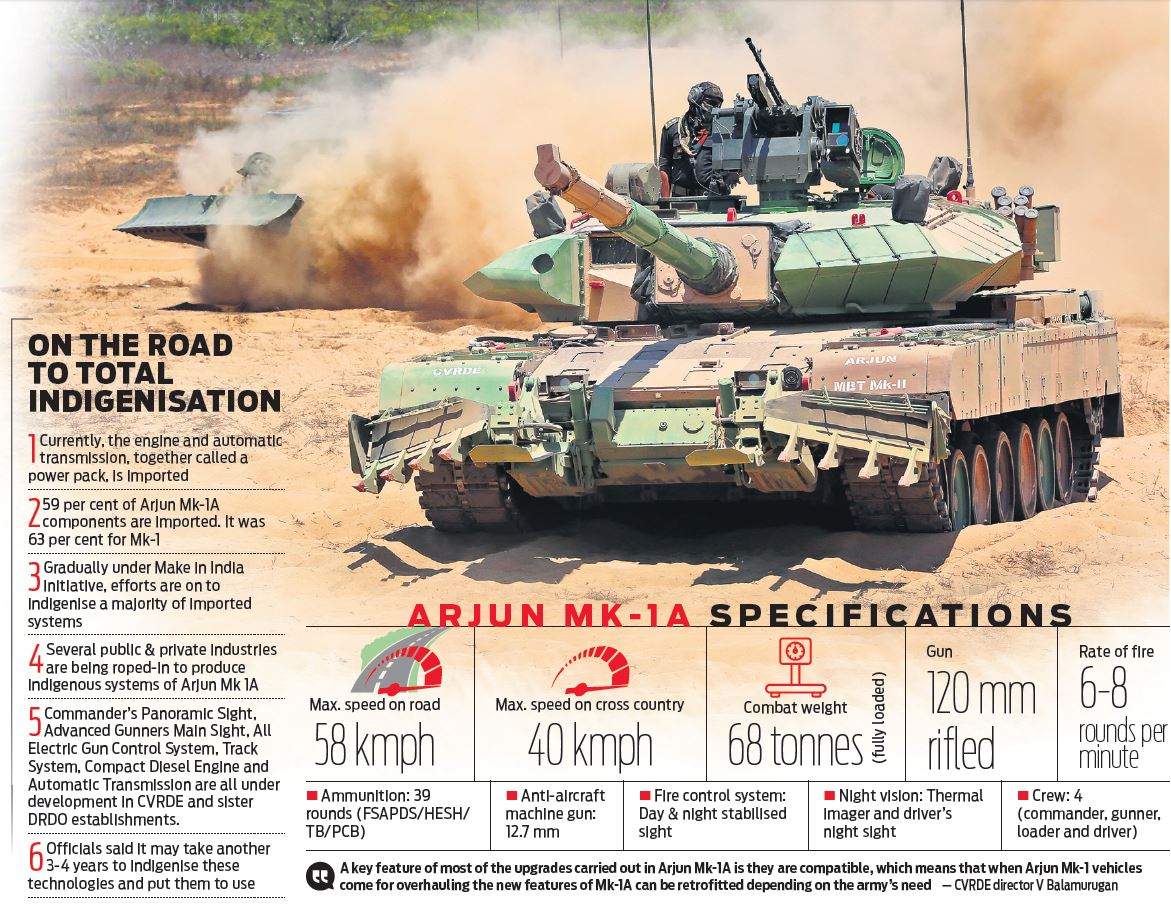Indigenously designed, Tanker Arjun reports for duty
India’s most sophisticated, indigenously designed battle tank, Arjun Mk-1A, has cleared all trials and is ready to go into production.

Chennai :
It’s the most lethal, sophisticated and all-weather battle tank that India has indigenously designed and conceptualised till date. Meet Arjun Mk-1A main battle tank, a 68-tonne rugged bull, waiting to join the Indian army. It will be a star attraction at the DefExpo India 2020 to be held in Lucknow in February.
Armoured Corps cleared the tank after successful completion of final integration tests conducted earlier this year in the western sector of Rajasthan. Arjun Mk-1A is an improved variant of Arjun Mk-1, whose two regiments (124 tanks) are in service.
Scientists of Chennai-based Combat Vehicles Research and Development Establishment (CVRDE), a Defence Research and Development Organisation (DRDO) lab, are the architects of this improved avatar of Arjun. The Heavy Vehicles Factory in Avadi is expected to commence production after receiving the order.
Top DRDO officials confirmed the new variant of Arjun had passed the rigorous army evaluation. “The tank has fulfilled all user specifications and undergone elaborate field trials. We expect the order of intent any time soon.” Officials said 72 improvements were made to Arjun MBT Mk-1A, of which 14 were major upgrades specifically requested by the army.
CVRDE Director V Balamurugan said the fundamental parameters of a battle tank are “fire power, protection and mobility”. Arjun MBT Mk-1A is improved on all these fronts.
Four upgrades were made to firepower. An improved Gunner’s Main Sight (GMS) integrated with Automatic Target Tracking (ATT) was fitted. This helps the crew track moving targets automatically, making it easy for the gunner to fire even when the tank is moving. The Commander’s Panoramic Sight (CPS Mk II) was integrated with Thermal Imager that enables the commander to effectively conduct surveillance in both day and night through eye-safe Laser Range Finder with advanced Hunter Killer Capability. Besides, additional varieties of ammunition were incorporated to enhance the lethality of the battle tank. Other than conventional Fin Stabilised Armour Piercing Discarding Sabot (FSAPDS) and High Explosive Squash Head (HESH) ammunition, Thermo Baric (TB) and Penetration Cum Blast (PCB) ammunition were developed.
Lastly, the vehicle was upgraded with a Remote Controlled Weapon Station that provides the loader capability of engaging ground and aerial targets from the protective envelop of the tank armour. It provides an additional capability to fight in urban areas called Hatch-closed firing.
Extra protection for crew
The battle tank will have a crew of a commander, gunner, loader and driver. Keeping them out of harm’s way is paramount. For this, Arjun Mk-1A comes with a slew of new features. Balamurugan said Track Width Mine Plough (TWMP) is a significant addition, which provides capability for the tank to easily cross minefields as the plough mounted to the front creates a mine-free path by tossing mines to the sides of the tank. The Explosive Reactive Armour (ERA) panels are provided for effective protection against ever-evolving anti-tank threats like shoulder-fired anti-tank grenades and missiles. These were mounted along the frontal arc of the hull and turret.
Another new feature is a Containerised Ammunition Bin with Individual Shutter (CABIS) that provides enhanced protection to the crew from inadvertent burning of ammunition stored in the ready round bin. Hot gas generated by ammunition burning is vented out by blow-off panels from the roof of the turret.
Besides, Arjun Mk-1A has protection against chemical attacks. A special chemical sensor is mounted to detect the presence of harmful toxic chemicals around the tank. “The sensor detects harmful chemicals, triggers an alarm and the Nuclear Chemical warfare system increases the pressure in the tank compartment to a level higher than in the atmosphere outside preventing toxic air from entering. The crew gets air through a particulate filter,” officials said.
The Roof Mounted Driver’s Seat protects the driver from shocks and enhances driving comfort. Other upgrades include a Laser Warning and Counter Measure System that protects the crew by creating a smokescreen between itself and the enemy and Anti Infra Red/Anti Thermal Imaging paints that reduce the tank’s signature when viewed through IR/TI cameras or goggles making it difficult for enemies to detect.
Mobility-related improvements
Officials said one of the challenges in making of Arjun MBT Mk-1A was the overall weight. Every improvement comes with baggage, which the user may not like as it may compromise mobility. To counter added weight, an Advanced Running Gear System was developed where the hydro-pneumatic suspension system was redesigned to enhance the tank’s agility. Tweaking the final drive also ensured the required agility.
An Advanced Land Navigation System was added to provide enhanced navigation capability in desert terrains during war. It provides accurate information of where the tank is using Inertial Navigation or GPS or both and where the tank needs to go in the absence of any signage in the war theater. An uncooled Night Vision camera for the driver has been provided. The obsolete Image Intensifier for the driver has been replaced with un-cooled Thermal imager with binocular sights, providing him with a capability to travel at reasonable speeds even in pitch-dark conditions.
source: http://www.newindianexpress.com / The New Indian Express / Home> States> Tamil Nadu / by S V Krishna Chaitanya / Express News Service / December 09th, 2019
